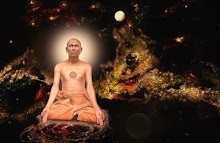But is this really so?

Imagine you are holding a fragrant rose in your hand. You see the wonderful colour and texture of the flower, you touch its soft and smooth petals and you smell its intoxicating fragrance. So far you have been involved in a physical way with this rose but how does it make you feel? Do you feel happier and a little brighter inside, does a smile come over your face, does it evoke distant memories, do you feel more peaceful, do you feel more loved or more loving? In a wonderful way that rose, out there in the physical world around us, has touched something deep inside you and you have responded.
Or imagine that you have just received a letter from somebody you knew a long time ago. You open the letter, see who it is from, and read the first few lines. They are just ink on paper but how do you feel? Do you feel surprised and pleased, does a feeling of warmth grow within as you recall your past friendship, are you transported back to another time and place, do you now feel close once again? Just like the rose, something as physical as ink and paper has touched you deep inside and you have responded.
These are just two examples of the countless situations we can find ourselves in when we realise that there is something much deeper to our lives than our physical being. Whilst our lives appear dominated by the physical world around us there is another world within us of feeling and thought where our deepest experiences take place and where we develop our real character. It is our inner world where, for example, we can feel deep joy when we are very close to someone we love and deep pain when we are separated.
Throughout the ages wise people have realised that we live in two worlds at the same time, a physical outer world and a deeper inner spiritual world. The problem is that we get so absorbed by the state of our physical outer world that we don’t spend enough time on the spiritual world within us. How many people, for example, struggling in a gym to improve their physical well-being, would spend just a little time on spiritual exercises to help them develop their inner world? Is this not a distorted view of our priorities?
Jesus highlighted the need to change our priorities in favour of the inner spiritual life when he said:
"Do not seek what you are to eat and what you are to drink, nor be worried. For all the nations of the world seek after these things, and your Father knows that you need them. Instead, seek his kingdom, and these things will be added to you". Luke 12:29-31
Pierre Teilhard de Chardin, the visionary Jesuit priest, wrote in the 20th century:
"We are not human beings having a spiritual experience; we are spiritual beings having a human experience".
Emanuel Swedenborg not only recognized that we are living in two worlds but also that when we die our real inner spiritual self goes on living:
"As regards the soul, which - it is said - goes on living after death, it is nothing else than the actual person living in the body. That is, the soul is the person's inner self acting in the world by means of the body and imparting life to the body. When his inner self is released from the body the person is called a spirit and then appears in a completely human form". Arcana Caelestia 6054
Should not our emphasis be on developing the quality of our inner life rather than worrying excessively as we do about our outer physical world?
"The best and most beautiful things in the world cannot be seen or even touched. They must be felt within the heart." Helen Keller


No comments:
Post a Comment